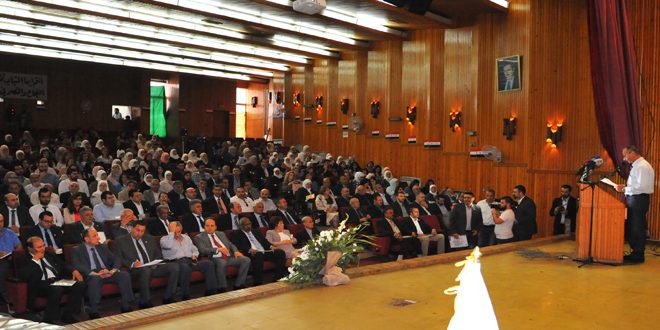DAMASCUS– Damascus is hosting the 108th session of the meeting of the Executive Office and the General Secretariat of the Arab Pharmacists Union after 7-year absence of activity in the Syrian capital.
According to SANA, the session’s activities started with an event discussing the concepts and applications of alternative therapy and traditional medicine, organized by the Syrian Pharmacists Syndicate in cooperation with Damascus University in the Faculty of Pharmacy.
Syndicate heads and representatives of pharmacist organizations from Lebanon, Egypt, Sudan, Libya, Tunisia, Jordan, Algeria, Palestine and Yemen have come to Damascus to discuss issues related to developing the pharmaceutical situation in the Arab countries.
“The [Arab Pharmacists] Union has been keen to be present in Damascus to assert national unity and stress that… Syria and the Arab countries, particularly Egypt, are one country,” said Muhei Obeid, Chairman of the Union and Head of the Egyptian Pharmacists Syndicate.
Obeid affirmed that the Union will support Syria under any circumstances, calling for cooperation between the Syrian and Egyptian universities and exchanging expertise, mainly in the clinical pharmacy specialization.
Ali Ibrahim, the Secretary General of the Arab Pharmacists Union, said all the “practices to terminate Syria’s membership in the Union” have failed as the Union adhered to its Arabism and Pan-Arabism. “Today we meet again in the pan-Arab Syria,” Ibrahim added.
Damascus has been chosen as the venue for the Union to announce the fruit of its efforts and work for several years and launch the most important of its scientific achievements, which is the Arab Pharmacy Board, said Ibrahim.
He noted that work on establishing the Board took more than ten years, referring also to the establishment of the Arab Academy for Pharmacist Skills Development.
In turn, Head of the Pharmacists Syndicate Mahmoud al-Hassan pointed out that the return of the Union’s activities in Damascus proves that Syria “is not alone in the war against terrorism” and it is supported by the Arab people.
In the same context, Prime Minister Imad Khamis held a meeting with the head and members of the Executive Office of the Arab Pharmacists Union, chaired by Obeid.
Talks focused on discussing means of improving and supporting pharmaceutical industries , registration of medicines among the Arab countries and the possibility of producing qualitative medicines, in addition to the need to boost cooperation among the Arab organizations working in the medicinal and pharmaceutical field.

